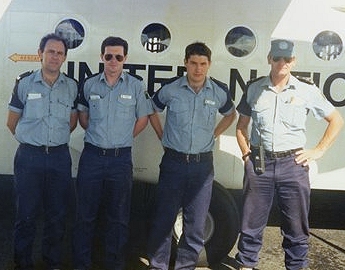 |
Sergeant Larry Mythen, Gardai John Buckley
and John Lehane, Sergeant Barry Worrall. |
Fifty Gardaí travelled to Namibia on the inaugural overseas mission with the United Nations (UN) in 1989. They made history that is now being celebrated, writes Bronagh McCrystal
When 35 members boarded a UN plane on 14th April 1989 bound for Windhoek, the Namibian capital, they were united in facing the unknown. The government had only recently passed the Garda Síochána Act that, for the first time, permitted members to participate with the United Nations civilian police component on overseas missions. A further 15 gardaí travelled out in August 1989. Their role in one of the UN's most successful missions will be celebrated with the unveiling of a plaque in Garda Headquarters on 1st April 2011, close to the date when Namibia will celebrate 21 years of Independence on 21st March.
They were attached to the United Nations Transition Assistance Group (UNTAG), a peacekeeping force deployed to Namibia to monitor the peace process there and ensure free and fair elections leading to the region's independence and the end of 75 years of South African rule. Gardaí were among the first group of civilian police along with colleagues from Sweden and The Netherlands. The police were used both to monitor police and security force actions to prevent electoral intimidation or human rights violations, as well as to assist with the establishment and maintenance of law and order in congested regions.
The group was led by Chief Superintendent Noel Anderson who retired in 1998. Anderson said, "I saw the mission as a great challenge. Moreover it was an opportunity to play my part in bringing about a new democratic country and to make a valuable contribution in some small way to world peace." Preparing for the celebration has inevitably lead to recollections and reminiscing of their year in Namibia, reading through journals, delving into boxes of photos and here they share some of those memories.
Sergeant John Lehane, Anglesea Street, said, "I always had an interest in going to Africa as it's a fascinating continent and the challenge of being involved in a UN mission really appealed to me.
"We definitely had a sense of being part of an historic mission. The government had to enact special legislation for us to go and there was a lot of media attention around us in Ireland. We even got a garda escort to the airport - my first and last! Gerry Ryan's team were with us and we were live on air from Dublin airport."
Training
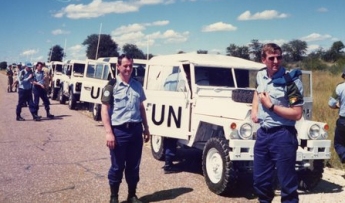 |
Convoy on the way to Oshataki
Gardaí Jerry Twomey and Jim Long. |
The initial 35 undertook an intensive six-week training course before their departure; learning of Namibia's population, culture and history. They also assessed likely problems they might face including personal safety, illness and loneliness. They undertook driving skills, map reading, survival skills and a programme of medication including malaria prevention. They received advice from the Defence Forces and APSO personnel on their experiences of living in Africa.
Lehane said, "Namibia is a huge country with a small population so we had to learn about the practicalities of the country - driving for hours and seeing no-one, the heat and necessity for having water with you at all times - and of course the historical and political background of the country." Retired member, Sergeant Breda Tobin left the Force two years ago after spending many years in Interpol. Tobin and Garda Marie Egan, Commissioner's Office, Garda Headquarters were the only Irish women on the mission. Breda Tobin said, "The training was intense and we were well prepared. We even learned to drive four-wheel drives. They tried to prepare us for every eventuality despite not knowing what we were going into." The UN had requested a former Assistant Commissioner of An Garda Síochána, Stephen Fanning, come out of retirement to lead the 1,500 strong police contingent from 25 countries, as Police Commissioner. En route to Namibia, the Irish contingent was joined on the plane by their Swedish and Dutch counterparts. Despite being on the plane for 24 hours they were not permitted to leave the aircraft during stops. Marie Egan recalls, "We were in civvies on the flight but every time we stopped to refuel we got back into uniform in the hope of getting off the plane. My partner gave me flowers at Dublin airport and they tried to confiscate them when I arrived in Namibia but I said 'no way'. Some of the lads had hurleys with them and they also wanted to confiscate them - as they didn't know what they were. There were photos in the local newspapers of us arriving with the lads on the tarmac explaining what their hurleys were." Egan and Tobin were the only women on the mission for the first few months and they attracted media attention. They worked in the main headquarters in Windhoek, monitoring complaints and liaising with local police.
Roles
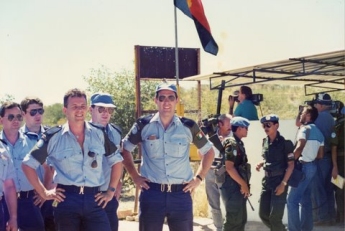 |
|
Irish officers at the Angolan border. |
Initially the Europeans were to be based in the far south of the country but prior to their arrival, on 1st April, fighting in the north, close to the Angolan border, between guerrillas of the South West African People's Organisation (SWAPO) and the South African Defence Force (SADF) left an estimated 350 dead. So the north became the focus as it was urgent to get the peace process back on track and 17 of the 35 immediately departed for the north. Superintendent Peter Fitzgerald (retired Deputy Commissioner) was Divisional Commander in the northern province of Ovamboland. Sergeant John Murray, who retired from MacCurtain Street, Cork in 2000, spent five months in Namibia, going out in October 1989 to replace a sergeant who was returning. He was based at Ohangwena, the main border crossing between Namibia and Angola.
Murray said, "The station was a critical UN base because of its proximity to the border. I was appointed liaison officer for the UN; liaising between the UN forces, the South African forces - army and police, and also the Angolans. It was a huge challenge but I loved it and I almost became native. I could have stayed there forever. When I was hit by the African scene of the beehive thatched houses I thought it was lovely."
Working with international counterparts
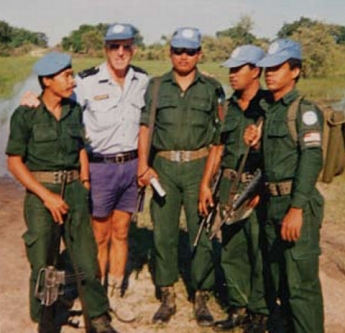 |
Sergeant John Murray with
UN Peacekeepers from Malaysia. |
Anderson said, "Being the first police mission, there was no structured programme in place. I decided on arrival to adopt our own policing systems and it proved immensely successful. After a couple of weeks we integrated very well.
"On many occasions the advice and assistance of our members at all ranks was sought by other officers and UN officials on the ground. I found the international police officers most cooperative and willing to undertake their duties very efficiently."
Sergeant Seamus Treacy, Ballymun, was part of the second group of 15 who went to Namibia in July. He was based in Ruakana - the furthest point north on the Angolan border. Treacy said, "My abiding member of arriving at Ruakana with no accommodation or resources was being met by the Malaysian Army who took us in and made us the most wonderful curry and put us up in tents for a few days until we found somewhere to live. They were lovely people. "This mission was the UN at its absolute best as you could be in a 4x4 with officers from East and West Germany and India and Pakistan. Despite what was going on in their homelands they were working together. I formed very close relationships with some of my Swedish colleagues and we still meet once a year and talk on the phone every month."
Relationship with the locals
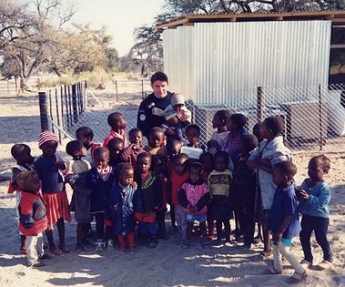 |
Garda John Lehane with a group
of children at a refugee camp. |
Everyone agrees that any initial suspicions about the UN presence on the part of the locals soon dissipated. With a history of police intimidation it was understandable but the UN was there to monitor and ensure this intimidation was investigated and stopped. The officers went out into the communities quickly as they wanted to communicate with the locals as a confidence building measure. They attended churches and during the three hour service the priest would introduce them to the congregation and they would do a question and answer session.
Garda Adrian O'Keefe, Togher Garda Station, said, "The locals were suspicious of us at first but as the year progressed it disappeared. The Irish were very popular and I think speaking English was definitely a bonus for us. We behaved more like a police force them a military one; we had more 'cop on' and flexibility. I got on very well with the locals and have many happy memories."
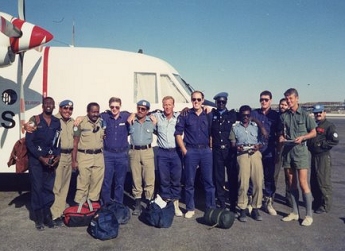 |
|
Members of the UNTAG group. |
Treacy said, "With the Irish 'gift of the gab' we connected with the people and in that unique Irish way we policed by connecting and engaging. Police forces have a different way of dealing with situations than the military and the Irish excelled at it. The Irish are highly respected in the UN. The beauty of the UN is that it allows you to be creative and to bring your own expertise and common sense while getting the job done, which is invaluable."
Noel Anderson said, "The local native population was overjoyed to see UN personnel on the ground. They could now display party symbols and flags freely without fear of repression. Waving of hands as UN vehicles passed was a regular feature. One member was heard to remark if we could get a plastic arm attached to the window to wave back continuously it would be most helpful.
"I was most fortunate in having a great team of police men and women on the ground. There were a number of violent situations when things could have got out of control. However, through initiative, firmness and good humour we were able to calm the situation so that wiser counsels could prevail."
Isolation
 |
Garda John Lehane catches
up with news from home. |
The country itself presented huge obstacles. With an area ten times the size of Ireland and a population of 1.3 million (now 2.1 million) it is the second least densely populated country in the world. A lot of the country is desert with towns hundreds of kilometres apart; so journeys were long and arduous.
Murray recalls a particular trip along the border in wet weather with a TV crew from Mozambique when they got lost on the return trip from a remote village. Following a massive thunder storm there was no way to retrace the tracks of his vehicle. They broke through the bush onto a 100 acre open plane that was filled with burnt and bombed out cars from fighting a few days previously. The passengers were dehydrated and begging for water and he had to stop them drinking water off the side of the road. Eventually they found their way back. At Ruakana Treacy lived alongside the nomadic Himba, the sixth most primitive tribe in the world and he recalls they were humble people with great dignity. He felt his rural upbringing in East Galway helped him adapt to the isolation. It was a three hour drive to the shop.
The election and Independence Day
The historic election was held over a four day period from 6-10th November 1989, with an astonishing 95.5% turnout. Passing off peacefully, the SWAPO gained 41 of the seats in the 72-member parliament and formed a government.
On the day the election results were to be announced a large crowd from the township arrived in the main street of Windhoek. They were supporters for the new government in a very jubilant mood. The riot police had turned up with the intention of suppressing this 'unauthorised' gathering, which would have entailed using tear gas and possible firearms. Anderson said, "On arrival I realised our forces although small in number had to act immediately. I approached the senior officer and left him in no doubt the consequences he and his men faced if they overreacted. I put an alternative suggestion strongly to him which I am glad to say he opted for in the end. I have no doubt there would have been a lot of bloodshed that day had force been used." Namibia's Independence Day celebrations took place in the Windhoek Sports Stadium on 21st March 1990. Numerous international representatives attended, including 20 heads of state and the arrival of Nelson Mandela, who had just been released from prison, caused great excitement among the 30,000 spectators. Lehane recalls trying to shake hands with Nelson Mandela but in the crush he only got to touch his shoulder while the recurring memory of that day for Superintendent Tom Lundon, Bruff, Limerick was seeing Yassar Arafat wearing a pearl handled revolver.
Heart-warming Tales
Tom Lundon received high praise upon his return as he had helped save the eyesight of a small Namibian boy. "I saw him on patrol and he had very bad eye infections, so I went to UN hospital and got a doctor to come and look at it. I had to pay the father money to take the child to the hospital but they managed to save the sight in one eye. I have promised my own sons that I'll bring them to Africa and I would love to meet that lad again and see how he has done in life."
O'Keefe and Lehane gained a lot of media attention in the local press and on television while in Namibia as they organised a children's Christmas party in the township of Katutura. O'Keefe said, "We organised the party through the church and the township's poorest children were invited. It was the first time they had ever experienced a Christmas party. Inspector Ted Nolan, (retired from Macroom Station) dressed up as Santa and arrived in the UN helicopter."
Bond
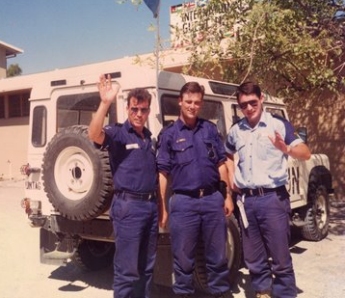 |
|
Gardaí John Mahon, Jim O'Niell and John Lehane. |
The bond between the group is instantly apparent and they have met on many occasions in the intervening 21 years. With the internet and skype these days it is easy to stay in touch with home, but in Namibia in 1989 it was a very different situation and the group relied on each other.
Breda Tobin said, "When the men came down to Windhoek from the north Marie and I would make a special effort to create a home from home. We had a party for everyone on Christmas morning. There was a real bond and when we came back it was our own group who really understood what we had experienced. It was very much a group effort. We wrote letters to home and there was an occasional phone call that cost a fortune. HQ used to send out newspapers and we'd all be waiting to pounce on them."
Marie Egan said, "I really enjoyed the experience but it was lonely at times and you felt a long way from home. People had days when they felt down, perhaps when they received a letter from home, but that was when you realised everybody was there for one another."
John Murray said, "From the top to the bottom it was everyone pulling together from the start. We were a family - when one was in trouble we were all in trouble. "I was leaving my wife and three children at home. The wives were the heroes who had to carry on while we were away. My wife came out to Namibia for two weeks and it was the trip of a lifetime for her. I kept a journal - a day by day account and I hadn't looked at it since I came back. It was like opening a time capsule." Treacy said, "We were a unique part of history as a group and we try to nurture that.
"My wife came out to visit me which was invaluable. Now when we meet as a group she's also reconnecting and has reference points."
Popularity of the Irish
Sergeant Peter Brunton, who is based in Whitehall Station, said, "We were working with guys from all over the world and it didn't take long for us to realise that the Irish were just as good at the job as the others. The legendary Irish 'gift of the gab' led to the ease of friendship with the locals.
"The Irish Army had done a fantastic job with the UN and had a great reputation, so the same was expected of us. We went out with an open mind and our policing principles worked there. We were prepared to listen to people and to explain why we were there under the UN mandate 435."
Lundon said, "What we may have lacked in computer skills we more than made up for it in our ability to deal with people. We never had a problem dealing with anyone over there. We'd rather talk than fight."
Lehane recalls that Martti Ahtisaari, the 10th President of Finland, who was the UN Special Representative to head UNTAG said, 'The Irish saved the mission'.
Further UN missions
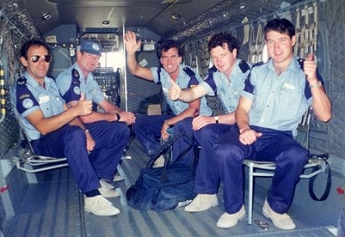 |
Sergeants Larry Mythen and Barry Worrell,
Gardaí John Mahon, John Buckley and John Lehane.
|
Everyone interviewed went on to assist in other UN missions - Tobin in Sarajevo, Lundon in Angola and Mozambique, Brunton in Bosnia, O'Keefe in South Africa and Cambodia, Murray in Cambodia, Egan in East Timor, Lehane in Yugoslavia, Treacy in Yugoslavia and Anderson in Tajikistan. Surely this is testament to how much they enjoyed and were proud of their Namibian experience.
Perhaps it is only in retrospect that they can understand and realise the enormity of the role they played. Egan said, "When I see the Namibian rugby team now playing on the world rugby stage and I see the flag I think I was part of making that flag for them."
Fanning said, "The team were a credit to An Garda Síochána and to the country. It was a very enjoyable experience and exceptionally successful for the UN. I was very proud of them all." Two members of the group have passed away; Gardaí Des Conneely and Joe O'Keefe but it is hoped all the others will take part in the celebrations on 1st April.